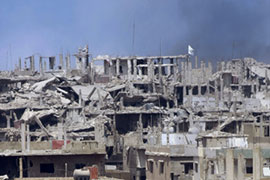Lebanese PM declares victory
Reconstruction promised after army takes control of Nahr al-Bared refugee camp.

The fighting has been Lebanon’s worst internal violence since the 1975-1990 civil war, with more than 300 people killed.
Rebuilding pledged
In a televised speech to the country on Sunday, Siniora said: “It is the greatest national victory for Lebanon over the terrorists in Nahr al-Bared.
“It is a great success that the Lebanese army has achieved over the terrorists, those who sought chaos, destruction and tragedies for Lebanon.”
 |
| The final push came after the families of the fighters were evacuated under a deal [AFP] |
Siniora repeated a promise to the thousands of Palestinian refugees who have fled the camp in the early days of the fighting to rebuild the devastated area.
Crowds gathered on the streets on Sunday afternoon with the news that the fighting had ended, while troops around the refugee camp fired celebratory shots into the air.
A senior security source said: “Most of the terrorists were killed today, the others have been captured. A few might have escaped, but the army is hunting them down.”
 |
| The refugee camp was all but destroyed in the fighting [AFP] |
According to the army, Fatah al-Islam fighters attacked their positions while trying to escape the camp in northern Lebanon early on Sunday.
Lebanese troops killed 39 fighters and captured at least 15.
The army had estimated that 35 active fighters remained in the camp before Sunday, but it was unclear whether all had tried to flee, the security source said.
Zeina Khodr, Al Jazeera’s correspondent in Lebanon, quoted some sources as saying that “fighters wearing army uniform launched an attack and maybe diverted the army [during which time] the leadership managed to escape”.
Toll rises
In all, more than 130 Fatah al-Islam fighters and 42 civilians have died in the Nahr al-Bared clashes.
On the government side, five soldiers were killed on Sunday, raising the army’s death toll to 157.
Sunday’s clashes were sparked when fighters from outside the camp drove up to an army checkpoint on the eastern edge of the camp and fired at soldiers, along with fighters inside, an army source said.
Fighters also attacked another checkpoint at the southern edge of the camp.
Search operation
Security forces launched a search operation and the area around the camp was cordoned off.
The road that links Tripoli to Syria was closed to traffic and army checkpoints were set up on other roads throughout the region, including the main highway to Beirut, Lebanon’s capital.
Khodr said that the checkpoints were stationed every 10 to 12 kilometres along the Beirut-Tripoli highway.
A security source said the army was concentrating its search in Ayun al-Samak, a village about 5km east of Nahr al-Bared.